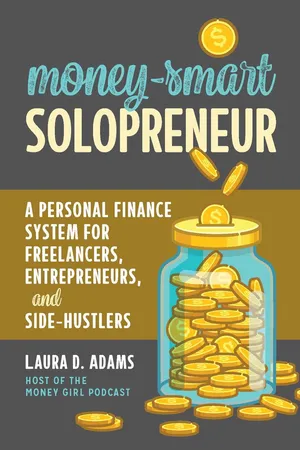
Money-Smart Solopreneur
A Personal Finance System for Freelancers, Entrepreneurs, and Side-Hustlers
- 200 pages
- English
- ePUB (mobile friendly)
- Available on iOS & Android
Money-Smart Solopreneur
A Personal Finance System for Freelancers, Entrepreneurs, and Side-Hustlers
About this book
Build Your Business and Your Financial Future
As a solopreneur, you can reinvent the way you work with much more freedom, fun, and financial security. There's never been a better time to earn more money by starting a full- or part-time solo venture. But being your own boss can be a challenge or feel scary when you don't have a roadmap.
In Money-Smart Solopreneur, Laura D. Adams answers questions every aspiring and new entrepreneur has about creating a business and building a secure financial future. It's a complete guide for what to do, critical mistakes to avoid, and how to start a solo business without taking too much risk. You'll get answers to these common questions:Can I get started without any filings or paperwork?Do I need a business bank account? How can I budget and reach goals with an irregular income?What business entity is best? When should I incorporate? How do I protect my intellectual property? When do I need an accountant? How can I figure out how much to charge clients?What tax deadlines am I required to meet? Do I need a business license? When should I leave my day job?Which tools are worth paying for?
No matter if you're a freelancer, independent contractor, or side-hustler in the on-demand economy, you'll get essential knowledge, tools, and inspiration to live a successful solopreneur life. Laura D. Adams demystifies how to start and build any solo or small business. She covers legal, financial, and tax issues you must know to stay out of trouble. Her upbeat tone and approach for managing variable income, using an automatic money system, and creating a self-employed benefits package are just a few gems you'll discover. Laura's smart tips and chapter exercises include refreshing strategies for earning more, managing the unexpected, and reaching financial goals. You'll come away empowered to build your full- or part-time solo business and create long-lasting financial security. After reading Money-Smart Solopreneur, you'll be able to:Earn full- or part-time self-employed income with confidence.Refine your business and brand vision.Evaluate the pros and cons of working as a solopreneur.Create a strategy to exit a day job by building a business on the side.Turbocharge your productivity using pro tips. Create a financial safety net and leapfrog to the life you want.Organize and legally protect your business using simple techniques.Set higher rates, create better proposals, and negotiate wisely.Save money by operating a home-based business.Set up an automatic money system to achieve goals and build wealth.Use the best tools to manage your personal and business finances easily.Know what taxes you must pay and how to reduce them as much as possible.Manage business records like a pro.Create your own self-employed benefits package with insurance and medical savings.Plan, save and invest for retirement using special accounts for solopreneurs.
Whether you work by yourself, with an outsourced team, from home, or in coffee shops, this essential guide will give you easy-to-follow tips and strategies to create more financial success. Here's what readers are saying about Money-Smart Solopreneur:
"No matter if you're building a business on the side or planning to exit a 9-5 job, Laura covers what you must know about managing money as your own boss. You'll learn how to thrive and create the financial future you deserve." -- FARNOOSH TORABI, FINANCIAL EXPERT AND HOST OF THE AWARD-WINNING PODCAST SO MONEY
"Money-Smart Solopreneur removes the obstacles that stop entrepreneurs from growing into their full, profitable potential. It is usually an oxymoron to put "enjoyable and easy to read financial advice" in one sentence, but Laura has delivered it all with this book. I will recommend it to every solopreneur I work with." -- PAMELA SLIM, AUTHOR OF ESCAPE FROM CUBICLE NATION AND BODY OF WORK
"This book is a must-read for anyone who's thinking about starting a solo business. It's easy to understand and gives practical advice for earning more, organizing your finances, staying out of trouble, and creating a lot more success as a solopreneur." -- DORIE CLARK, AUTHOR OF ENTREPRENEURIAL YOU AND EXECUTIVE EDUCATION FACULTY AT DUKE UNIVERSITY'S FUQUA SCHOOL OF BUSINESS
"A time-saving guide that will light up your path to success!" -- MIGNON FOGARTY, GRAMMAR GIRL AND FOUNDER OF THE QUICK AND DIRTY TIPS NETWORK
"Money-Smart Solopreneur gives you valuable knowledge and tools to create a business based on your own definition of success. It's perfect for anyone who wants to succeed and thrive at running their own company." -- PAUL JARVIS, AUTHOR OF COMPANY OF ONE
"A clear-eyed, honest, and approachable guide jam-packed with what you need to know to make the right jump in your career and life." -- MIKE LEWIS, AUTHOR OF WHEN TO JUMP: IF THE JOB YOU HAVE ISN'T THE LIFE YOU WANT
"Laura Adams somehow makes personal finance fun and educational at the same time - there's no one I'd rather get tips from when it comes to managing my own finances. Whether you're running your own business full-time or on the side, this book is an excellent resource." -- KIMBERLY PALMER, AUTHOR OF THE ECONOMY OF YOU
"This book is more than mere inspiration. Laura Adams has written an indispensable map for navigating the pitfalls everyone faces (but doesn't think about) when they're starting a side hustle or their own business." -- CHRIS HILL, HOST OF MOTLEY FOOL MONEY
"If you're ready to become a full-time entrepreneur or add solo work on the side of a day job, Laura covers what you must know about managing money. Use Money-Smart Solopreneur to build your business and a strong financial future." -- GERRI DETWEILER, SMALL BUSINESS AND FINANCING EXPERT AT GERRIDETWEILER.COM
"Whether your goal is to create a side business or a full-time venture, Laura covers what every solopreneur needs to know. You'll learn how to build your financial future starting now." -- PATRICK MCGINNIS, AUTHOR OF THE 10% ENTREPRENEUR AND FEAR OF MISSING OUT
"If you've been dreaming about starting your own business but don't know how, Laura Adams provides a detailed blueprint to help you make the leap to self-employment. Her easy-to-follow tips will help you overcome your fears of becoming your own boss, create a financial safety net to get your business up and running, and boost your chances of success." -- CAMERON HUDDLESTON, AWARD-WINNING PERSONAL FINANCE JOURNALIST AND FORBES.COM CONTRIBUTOR
"No more "winging it" and hoping for the best with your solo business. Use this effective system to ensure you're making the most of your entrepreneurial passion. Laura's done it, and so can you!" -- PHILIP TAYLOR, FOUNDER OF PART-TIME MONEY AND FINCON
"If there ever was a time to start a business, it's right now. Money-Smart Solopreneur is the perfect guide to help you successfully start, build and grow a profitable business that can in turn help you achieve your financial goals." -- BOLA SOKUNBI, FOUNDER AND CEO OF CLEVER GIRL FINANCE
"Money-Smart Solopreneur is an invaluable, easy to read guide to starting and running your solopreneur business. Laura covers everything you need to know through a combination of stories and action steps. Money-Smart Solopreneur covers all facets of starting and running your Solopreneur business. As a long-time solopreneur, this book would have served as an excellent roadmap in creating and managing my business. I highly recommend this book, whether you are just starting out as a solopreneur or have been a solopreneur for years. Money-Smart Solopreneur is a must have for your bookshelf." -- TONY STEUER, AUTHOR AND FINANCIAL PREPAREDNESS ADVOCATE AT TONYSTEUER.COM
"Being a solopreneur doesn't mean you have to walk alone. With her wisdom and first-hand experience, Laura Adams is a first-rate guide, pointing out the various pits and traps that snag the best of us out there working on our own. While being an entrepreneur is hard, Laura tackles even the hardest questions here in a straightforward, easy-to-understand way, so that you can focus on what you do best: working hard at bringing your vision to the world." -- JOE SAUL-SEHY, CREATOR AND CO-HOST OF THE STACKING BENJAMINS PODCAST
"Where was this book when I became a solopreneur?! Money-Smart Solopreneur is a smart step-by-step guide for what to do—and what not to do—when you're heading down the solopreneurship path. Laura Adams's book is an easy-to-digest recipe for cooking up solopreneur success." -- JOHN EGAN, PERSONAL FINANCE EXPERT AND OWNER OF JAYHAWK MEDIA LLC
Frequently asked questions
- Essential is ideal for learners and professionals who enjoy exploring a wide range of subjects. Access the Essential Library with 800,000+ trusted titles and best-sellers across business, personal growth, and the humanities. Includes unlimited reading time and Standard Read Aloud voice.
- Complete: Perfect for advanced learners and researchers needing full, unrestricted access. Unlock 1.4M+ books across hundreds of subjects, including academic and specialized titles. The Complete Plan also includes advanced features like Premium Read Aloud and Research Assistant.
Please note we cannot support devices running on iOS 13 and Android 7 or earlier. Learn more about using the app.
Information




Table of contents
- Cover
- Title Page
- Copyright
- Contents
- Introduction
- Part I: Becoming Your Own Boss (Even Part Time)
- Part II: Organizing Your Solo Business
- Part III: Managing your Finances for Success
- Part IV: Understanding Business Taxes
- Part V: Building Your Own Benefits Package
- Acknowledgments
- About the Author
- Index